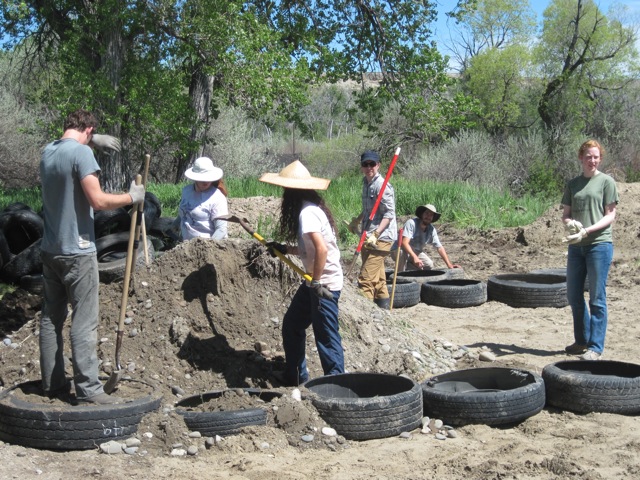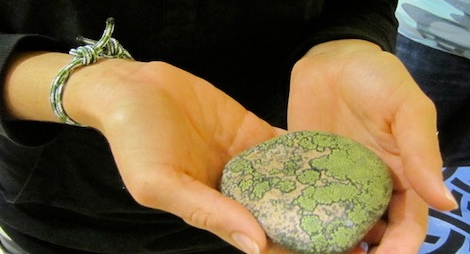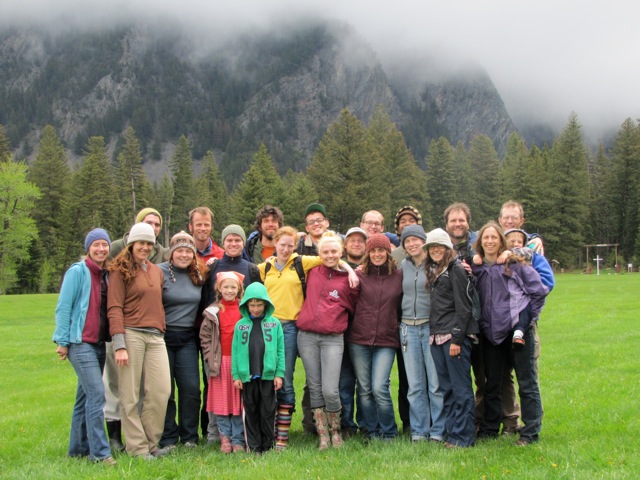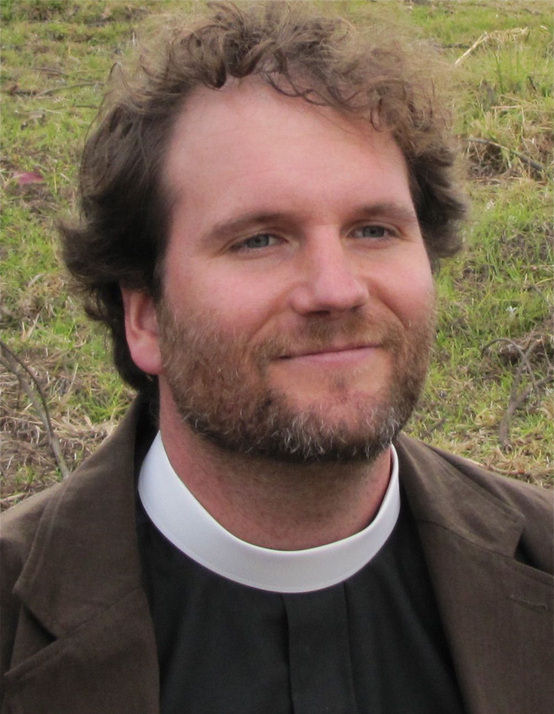Eco-Stewards: a Christian community of young adults responding to God’s call through applied eco-stewardship.
By Rob Mark View and Print as PDF.
View and Print as PDF.
Sometimes, upon waking, the weight of a wounded planet is palpable. We are beset by extreme weather events that continue to raise high the warning flags of the new normal that is climate chaos—and by a shamefully decreased political will to be the least bit prophetic (or at least responsive). It is enough to stymie even the most hopeful person who claims faith in the Author of Hope. And often, even the best efforts from forward thinking churches, who regularly weave in all-things eco, don’t seem to be enough to curb the tides of depressed inactivity.
We are overwhelmed into inertia.
This is why I wear an Eco-Stewards bracelet year-round (pictured above).
This simple shock cord, given to each participant in the program, reminds me there are people engaged in moments (if not movements) of creative resistance. It reminds me that the antidote to this inertia is regular exposure to stories of creative, alternative, grace-laced community resistance to the broadly accepted myth of consumption paradise and fossil fuel inevitability. These stories point to simple moments of localized change we can believe in—and begin to embody. Sharing such stories should become a valued spiritual discipline.
 Since its humble yet energized inception in 2006, the Eco-Stewards Program has been striving to create such forums for a growing community of shock-chord bracelet-ed souls. And it remains a true antidote against cynical stagnation for me: a fluid, constructed theology of grace that encourages engagement.
Since its humble yet energized inception in 2006, the Eco-Stewards Program has been striving to create such forums for a growing community of shock-chord bracelet-ed souls. And it remains a true antidote against cynical stagnation for me: a fluid, constructed theology of grace that encourages engagement.
Here are the basics: the Eco-Stewards Program is a Christian community responding to God’s call through applied eco-stewardship. It seeks to educate, train, and inspire young adults (ages 20-30) in the ways of eco-stewardship within the wider context of Christian faith. The program shares roots in and draws partial support from the Presbyterian Church (U.S.A.) Environmental Ministries, Presbyterians for Earth Care, and the Presbyterian Camp and Conference Association (PCCCA). The overarching goal of this grass-roots initiative is to help young adults connect and share their passions for faith and environmental stewardship through participation in place-based learning programs that explore how faith communities are responding to challenges from climate change to mountaintop coal removal. During these week-long programs, eco-stewards spend time reflecting upon and sharing personal eco-faith journeys, taking part in a hands on eco-project, exploring the outdoors, playing music, and experiencing worship together. Paid summer internships are also offered. Composting toilets and used tire earth-ships have been built; urban gardens have been visited; and numerous conversations with eco-faith-practitioners have been enjoyed.
 Something hopeful is happening through this program. Therefore, in the spirit of what I consider a new spiritual discipline, I wish to share a few glimpses of creative resistance that I’ve observed through my years serving the Eco-Stewards Program. Accept these as vignettes of micro-movements that breathe of graceful alternatives:
Something hopeful is happening through this program. Therefore, in the spirit of what I consider a new spiritual discipline, I wish to share a few glimpses of creative resistance that I’ve observed through my years serving the Eco-Stewards Program. Accept these as vignettes of micro-movements that breathe of graceful alternatives:
- Paddling down New York City’s Bronx River in canoes, sweeping past effluent pipes spewing unknown pollution, in search of some faithfully prophetic volunteer work for youth dedicated to greening abandoned properties. Upon finding these transformed parks, the words of Psalm 24 shared aloud: “the earth is the lord’s and every living thing.”
- After spending time on the Crow Indian Reservation following significant flooding, breaking bread and sharing the cup of the common vine of the earth during communion in a tiny chapel perched below snow-capped Montana mountains. Prayers then shared for the specific faces of poverty we’d met who are most affected by climate change.
- Feeling the enormity of the environmental and spiritual problem of mountain top removal in rural West Virginia while engaging with Christian activists near the site of the recent Upper Big Branch mine disaster. Then finding inspiration from locals putting their faith into action through non-violent resistance.
- A bone chillingly beautiful swim in the Mad River. Speaking with Bill McKibben in Middlebury, Vermont, and being encouraged to keep up the faithful work and bring the message of divestment from the dirty fossil fuel industry back to universities, churches, and communities.
- Building a composting toilet amongst the tall Douglas fir trees not far from famous Californian redwood stands while carrying on discussions on how to engage home church communities around issues of consumption and justice. Under the shade of the same trees the next day, sharing our eco-faith journeys with one another using copious amounts of recycled post-it notes.
- Sitting under a starry night sky pondering together the notion of vocational calling and how best to engage personal passions and gifts in service. Finishing off these sacred ponderings with some equally holy campfire-lit joyous guitar-led singing.
Recalling these few moments of graceful alternatives helps re-inspire my own calling to continue to help create such forums. I trust that, in sharing them, I remind us all of both the importance of continuing to come together as beloved community in our work for ecological hope and the equal importance of telling each other about these glimpses.
Let us hold fast to the confession of our hope without wavering, for God who has promised is faithful. And let us consider how to provoke one another to love and good deeds, not neglecting to meet together, as is the habit of some, but encouraging one another, and all the more as you see the Day approaching.
~Romans 10: 23-25
PS—check out two wonderful video slide show stories about Eco-Stewards’ creative resistance!
In the Author of Hope,
Rob Mark
Learn more about the Eco-Stewards and consider becoming one today (or encouraging young adults in your life and community to join)
Read more articles like this one in the Nov 2012–Jan 2013 issue, “Hope for Eco-Activists: Discovering an Environmental Faith“
Rev. Robert J. Mark first felt a call toward ministry of peace and justice while living and working in a poor community in South Africa. After graduation from Wheaton, Illinois, he worked as a youth minister, coordinated a sister church partnership in Uganda, and then became a project administrator for a biodiversity and sustainable forestry firm. He earned his Master of Divinity degree at Boston University in 2005. In addition to serving congregations, Rob has worked as a Camp Director and as the Executive Director of a community center for the homeless and low-income community. He currently serves as the pastor of the Congregation of Church of the Covenant. He has completed extensive training in Earthcare, pastoral care, and congregational redevelopment, among other topics.











Pingback: Glimpses of Creative Resistance: Eco-Stewards | Unbound |
Thank-you Rev. Rob Mark for sharing your experiences with the Eco-Stewards Program and for all you have done over the years to create and grow this community. I see these “glimpses” as experiences of Koinonia – each moment that you share is so vivid, so real. They go beyond merely recognizing that there is both suffering and great beauty in our world – and reveal that by seeking and listening for both alongside fellow journeyers, we find they are often intertwined.
“Sharing such stories should become a valued spiritual discipline.”
It is through stories that our ancestors lived, passing down information, genealogies, solutions to hardship, hope for the future, knowledge and wisdom– everything. Some how along the way the stories changed. Alteration is a natural part of life, however the American story has taken a turn in a different direction. It’s personal, individualized, and at times selfish. How can I succeed? What must I do to get a job, a house, a family, to pay bills. Even spiritually, our society focus becomes overly concerned with the individual’s holiness. While this is a vital aspect of our faith, it is important to keep in mind that we are called to love our neighbors and God, and this is something we must do together. When hard times fall upon us, serving and the care for others is often secondary. Sadly, care for the environment is even further away.
We need to reinvigorate our stories, realizing that the narratives we live by host an amalgamation of characters, settings, and issues. We have the opportunity to connect with each other, sharing our stories and establishing communal empowerment across borders and distances. We are our brother’s keeper and the world and it’s problems are too big and too numerous to conquer alone.
It is for this reason that I am overly grateful to have found the Eco-Stewards. Drawing from their narratives, I know we are sharing life’s hardships, along with it’s joys and celebrations. We live in an interconnected world, and it is only natural to connect our spiritual lives through such interconnected stories. It is truly a discipline to be upheld and cherished in our faith circles today.
Meaningful theology happens (I think) after we figure out where to get involved in what the Spirit is doing. Thanks Rob for helping folks get involved and for cultivating shoots of theological reflection with real roots!
Pingback: Glimpses of Creative Resistance | The Eco-Stewards Program
“Sitting under a starry night sky pondering together the notion of vocational calling and how best to engage personal passions and gifts in service.”
Rob, you put this so well. Our lives are filled with constantly doing something – it’s great to take time to think about why we’re doing all that something. This contemplating of vocational direction is a huge part of the Eco-Stewards experience for me. I think wild, uncontrolled landscapes are the perfect places to think about what makes us come alive and how we can do that in the world. Like Vicki said – so many of us are focused on getting a job, a house, a family, paying bills that we spend little time considering why these are our goals and how we can live for more. In our busy lives we need more contemplation before action. I believe this can happen in the outdoors with the connection and support of a community like Eco-Stewards.